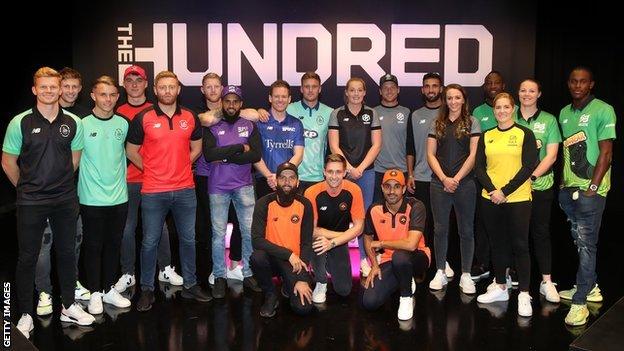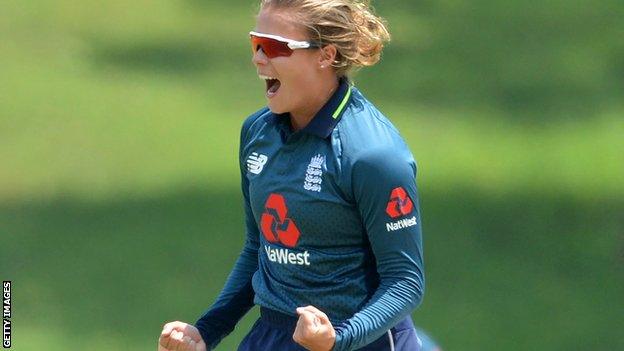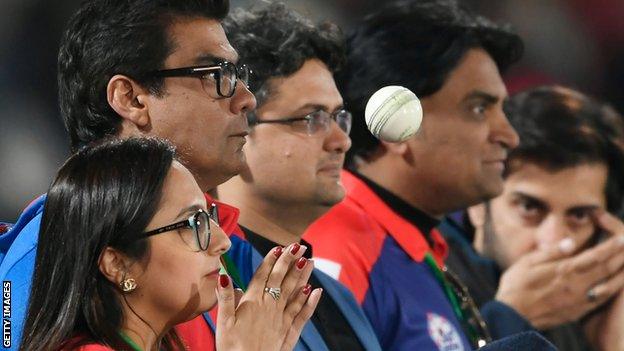The Hundred: How postponement affects players and counties
- Published

This year's Hundred was due to begin on 17 July and end on 15 August
The Hundred, cricket's flagship new tournament, has become the latest sporting casualty of the coronavirus pandemic after being postponed until 2021.
The competition's organisers, the England and Wales Cricket Board (ECB), hoped it would deliver a new, more diverse audience to the sport and have invested millions of pounds into it.
Eight new city-based teams - a first for the sport in the UK - had been created, star players had been signed up to big-money contracts, and some matches were to be shown live on BBC television for the first time since 1999.
But what happens now? What are the ramifications for cricket following this latest sporting postponement of a competition which had a £40m budget in its first year?
Can it just all go ahead as planned in 2021?

A number of England men and women players, including Joe Root, Ben Stokes and Katherine Brunt, were due to feature in this year's competition
After announcing news of the postponement, ECB chief executive Tom Harrison told BBC Sport that The Hundred would be going ahead in 2021 "as had been planned" for this year, with the same eight teams playing the same 100-ball format.
"This is a competition that is designed not only to become a commercial powerhouse but to grow the audience of cricket around the country for young people, for diverse communities, and build on what we have with cricket in this country," Harrison said.
Fifteen players were signed by each of the eight teams in October and organisers hope to largely move forward with the same squads for next year rather than holding a new draft.
That said, international player availabilities for 2021 could well prove to be a sticking point.
Leg-spinner Rashid Khan, for example, was signed for the maximum price of £125,000 by Trent Rockets for 2020 but, as it stands, has international commitments with Afghanistan in July and August 2021.
Further complications will be caused by the changes to rules regarding Kolpak players after Brexit.
Kolpak contracts allow sportsmen and women from countries with associate trade agreements with the European Union, such as South Africa, Zimbabwe and Caribbean nations, to be afforded the same right to free movement as EU citizens.
Fourteen Kolpak players were signed as non-overseas men's players for 2020 but when rules change when the UK leaves the EU, those players will no longer be eligible as domestic players and all overseas spots are currently taken.
'You might see me working in Tesco'

Alex Hartley last played for England in March 2019
One area the cancellation of The Hundred in 2020 may be acutely felt is the women's game.
The men's and women's tournaments were set to run simultaneously and, while the men are able to fall back on their county wages, there is no equivalent for women.
Discussions are ongoing regarding player salaries for 2020 but those talks remain at an early stage.
A number of options are on the table, including players receiving a percentage of what they were due to earn or deferring contracts until next year.
After the Kia Super League was disbanded, The Hundred was due to be the only source of income for many female cricketers in England, other than for the 21 players centrally contracted to England.
Spinner Alex Hartley, who was part of the England team which won the World Cup in 2017, lost her central contract last year and fears she could end up being lost to the game.
"I am missing out on a significant amount of money that I was relying on to support myself," the 26-year-old told BBC Sport.
"I am playing things by ear but you might see me stacking toilet roll in Tesco by the end of the summer if no cricket is played because I will have no job."
Prize money was set to be equal but, unlike the men's contracts, the individual deals earned by women's Hundred players have not been disclosed.
The salary brackets are far lower than the men's, however. The lowest paid men's player was due to earn £30,000, while the highest paid women's player was set to take home £15,000.
"I haven't played cricket since August last year," Hartley added.
"Why would a team want to pay me to play cricket for them if I haven't played cricket for 18 months?"
Harrison said there has been "no dilution on our commitment to women's cricket".
The ECB still intends to award 40 new full-time contracts for female players this year, as previously announced.
Will players receive 'life-changing' salaries?
Male players signed for The Hundred were set to earn up to £125,000 for the five-week tournament and some had "their lives changed" by October's draft, according to England and Yorkshire's Dawid Malan, who was set to play for Trent Rockets.
"They probably got picked up for more than they get paid in county cricket," Malan told BBC Sport. "It was a massive financial boost for the players who got picked up."
Somerset's Eddie Byrom, 22, was a surprise signing for Manchester Originals and told BBC Sport he was planning to put his £30,000 deal towards a deposit for a house - plans which may now be put on hold.
His team-mate Tom Abell was also snapped up by the Originals, on a £100,000 contract, and he explained how the postponement will not only have a financial impact, but could affect his career aspirations.
"The opportunity it would have presented, and hopefully still will in the future, is immense," Abell said while, like Byrom, stressing there are more important things going on in the world at present.
"My dream and ambition is to play for England. If you want that to be realistic you have to be playing in these sorts of competitions."
Some players, including Tymal Mills and Harry Gurney, had reportedly taken out insurance on their earnings.
Malan added: "There could be a lot of players losing a lot of money because of this, but we can't really complain about that because there are people all over the world who are unemployed because of this situation."
What about the counties?
The Hundred's cancellation comes at a time when the finances of the 18 first-class counties are under significant pressure because of coronavirus.
Last week, Glamorgan, who will host Welsh Fire at their Cardiff home, said they are still supportive of the competition, a view held by many other counties.
The ECB has already paid out half of the £1.3m due to each county from The Hundred, while a £61m rescue package was announced this month to help the counties deal with the crisis.
That said, one county told BBC Sport they will miss out on about £2.7m they were expecting to receive through hosting fees, hospitality and retail had the tournament gone ahead as planned.
'The Hundred could be bigger than the IPL'

Salman Iqbal (second left), owner of the Karachi Kings, would "love" to invest in a Hundred team
The ECB still hopes to host some cricket, both domestic and international, this season, potentially behind closed doors, but Harrison said cricket will be dealing with a "very significant financial impact" after the pandemic.
On Monday, a report from financial advisory firm Oakwell Sports recommended allowing external investment into the eight Hundred teams to lessen the financial burden on the governing body.
It said foreign investment could also help grow the competition overseas by attracting foreign fans and players, particularly from South Asia.
Speaking to the BBC on Thursday, Harrison did not rule out foreign investment and said one of the benefits of The Hundred is it can help "diversify revenue streams going forward".
Businessman Salman Iqbal, who owns Pakistan Super League team Karachi Kings, told BBC Sport he would "love" to invest in a Hundred team and if the competition allowed investment it could become "bigger" than the Indian Premier League (IPL).
"All sports need investment," Iqbal said. "They need good investments and owners who know cricket and know how to market sports."